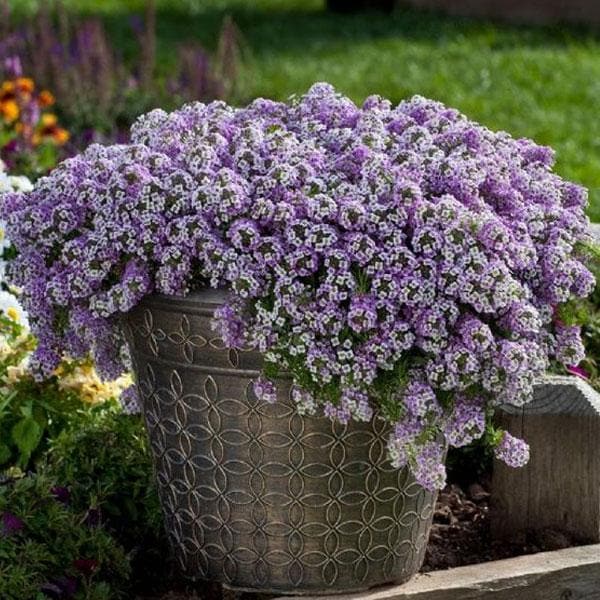Description
Alyssum or Sweet Alyssum plants produce long, oval leaves and flowers that can be pink, purple, yellow or white in colour.
Sweet Alyssum is a delicate carpet of tiny flowers with a subtle, sweet scent. The low-growing foliage is covered by flowers for much of the growing season. Sweet Alyssum (Lobularia maritima) is very easy to grow, from plant or seed.
Sweet Alyssum is a cool season flower that can be set out in early spring are grown throughout the fall and winter, in frost-free climates. Most varieties will fade in the heat, but rally again in the fall.Plant Specifications
| Common Name | Sweet alyssum |
| Maximum Reachable Height | Height: 0.25 to 0.75 feetSpread: 0.50 to 1.00 feet |
| Flower Colour | lavender |
| Bloom Time | April to June |
| Difficulty Level | Medium |
Planting and care
Alyssum care
Sweet alyssum grows only a few inches high but spreads as much as a foot in diameter. The tiny flowers are closely packed around small racemes that grow upward as lower flowers fade. Although white is the most planted colour, pink, lavender, and darker shades of violet are also available.
To start Sweet Alyssum from seed, simply scatter the seed and press it down, so that it makes good contact with the soil, but it is still exposed to light. Keep the soil moist, until germination. Then water whenever the soil feels dry.
Direct seed in garden in mid- to late spring, or indoors 4 to 6 weeks before last frost. Do not cover the seeds, as they need light to germinate.
| Sunlight | Full sun to part shade |
| Watering | Keep the soil moist, until germination. Then water whenever the soil feels dry. |
| Soil | Alyssum perfers a neutral soil pH and a rich, loamy soil. |
| Temperature | Germination temperature: 65 F to 70 F |
| Fertilizer | Your in ground alyssum plants should not need any fertilizer, unless your soil is poor. Container alyssum plants will need more frequent water and monthly feedings with a water soluble fertilizer. |
Alyssum special feature
It is a mat-forming plant that produces spreading mounds of well-branched stems clad with linear, lance-shaped, gray-green leaves (to 1, long).
Alyssum uses
Ornamental Use:
- Sweet alyssum grows best where it can be showcased
- Plant or sow seeds in front of flower borders, in containers with other taller growing annuals, such as salvia and profusion zinnias, and in walls or rock gardens among other low growing perennials and wild flowers, such as columbine



Comment